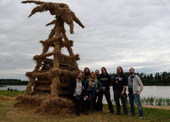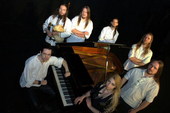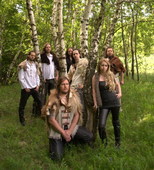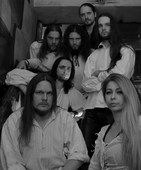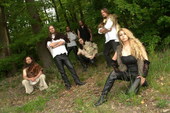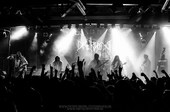Dalriada
Hungarian History Is Too Good Not To Sing About It
15.07.2015
Архив интервью | Русская версияNo matter if you have no idea about it, but Hungary is a country where rock and metal are loved and played a lot. However, even the most outstanding Hungarian bands usually confine themselves to the borders of their homeland, and their fame doesn’t spread to other countries as much as those bands really deserve. Luckily, there are exceptions, and Dalriada, folk metallers from the town of Sopron, are definitely among them. A few years ago they had an album out on Germany’s AFM Records, and they are ready and willing to tour abroad, playing at various festivals all over Europe. One of their next stops will be in Russia, at the third edition of Folk Summer Festival, and upon learning about it, we did not hesitate to ask the organizers of the event to get us an interview with somebody from the band, as more than one of our reporters have a soft spot for Hungarian music. Our conversation with drummer Tadeusz Rieckmann was severely plagued by technical problems, but nevertheless, he succeeded in telling us about the latest news from the band and giving a brief overview of what Dalriada is all about.
You will soon play in Russia for the first time at Folk Summer Festival. What are your expectations from the festival and the trip in general?
We are really excited to get to travel to Moscow and Gus-Khrustalny and Russia in general. I think this is going to be a really great weekend for us, since we are very interested in getting to know new cultures, new countries, new cities and new venues. In this aspect, Folk Summer Festival is going to be very interesting, and very like folk metal. (laughs)
You have recently played at very diverse events, for instance, Kiklim Zaibu festival in Lithuania, and also Wave Gotik Treffen in Germany. What are your impressions? Which one did you enjoy most of all?
It’s a very difficult question. We enjoyed Wave Gotik Treffen in Leipzig, Germany, a lot. Actually we had two gigs there, on Sunday and Monday, at two different venues, and both were really outstanding. They were totally different, one of them was outside, with a very dense crowd, and the other one was in a huge arena-like venue, and as we played quite early, the crowd was not that dense at that point, but nevertheless, it was a great experience. And Lithuania is going to be one of our favorites of this year, because it was at extremely beautiful and astonishing scenery. It was next to a lake, with bonfires and an open stage. It was really marvelous to be there.
And in your home country, Hungary, do you have a favorite festival?
Well, there is a couple. For example, Rockmaraton, it’s going to be held next week, and we are going to play there on Wednesday. It’s been moved to a new location, it’s not in the very south of Hungary anymore. It was previously held next to Pecs, but this time it’s in Dunaujvaros, next to the Danube. Nevertheless, it’s one of our favorites, we’ve been playing there every year for the last 10 years.
We know that you are going to release a new album called “Aldas” in September. This album comes three years after a previous one, “Napisten Hava”, and the band has never had such long breaks in between albums before. Why did it take you so long to make a record this time?
One of the reasons is that Laura (Binder, vocals) gave birth to a baby boy in the beginning of 2013, and she was off for some time. We had to take it slow for a couple of months until she recovered and got used to the new state of being a mother. And Andras (Ficzek, vocals, guitar), who takes care of writing the songs, was also there. 2013 was quite a difficult year for us, and that was why we had to postpone the new album a little bit. But now we’re almost ready, and it’s coming out in September.
What shall the fans expect from the upcoming album? How much will it be different from the ones before?
It’s going to be very honest in terms of new mentality and musical jokes as well. It’s going to be very near to our hearts. It’s going to be a mix of the latest album, “Napisten Hava”, and the fourth album, “Szelek” (2008), that may be a good way of how to describe it, but it will still be more than those two albums, of course, since it’s a totally new one, and we gained more experience over the past three years. I think there will be one or two moments in the songs that will raise some eyebrows among the listeners. They won’t get it at the first listen.
Do you keep working with Nail Records, or will some other label release it?
It’s going to be on Nail Records, and in Germany it will be distributed by Einheit Productions, these twp labels are going to be the main ones for us.
A few years ago you got signed to Germany’s AFM Records for the release of the ”Igeret” album (2011). Why did this cooperation end after just one album? Do you think the band benefited from it?
It was absolutely useful and beneficial, we gained some experience, of course, and some visibility. I mean, we got some really good advertisements throughout the world for the sixth album back in the day. But I think at the end of the day we had different ideas of how to continue with the band and how to get new shows and new venues abroad. We just had different opinions on how to reach out to the people.
This month you will release a compilation, “Mesek, Almok, Regek”, which will be only available together with the new issue of the Hungarian Metal Hammer Magazine. Actually we don’t quite understand where the figure “X” in the title comes from – your first album is already 11 years old, and the band existed long before that. Could you explain what the figure” X” means on the cover?
It comes from the 10-year anniversary gig which we did last year in January. That was not the 10th anniversary of the band, but the 10th anniversary of the first album, “Fergeteg” (2004).
Speaking about early days of Dalriada, where did the concept of mixing heavy metal with Hungarian folk music come from? As far as I understand, no one did it before. There were folk metal bands in Finland or England, but not in your country…
Yes, almost. What we did was actually the first mix of authentic traditional Hungarian music and heavy/death metal. This idea originally came from our singer/songwriter/guitarist Andras - I can remember when we had our old rehearsal room, I was getting to a rehearsal, and he was sitting in front of a small cassette recorder, and playing a traditional Hungarian folk song called “Hidegen Fujnak A Szelek”. He looked at me and said, “We have to cover this song”. I think that was maybe one of the first thoughts that we should turn to that direction.
Many folk metal bands focus on such themes as war and drinking, but Dalriada, as far as we understand, sings mostly about Hungarian history, legends and myths. How did the lyrical concept of the band come together? Did you decide from day one that this is what you are going to be singing about, or was there a sort of evolution or development?
I think we can say this was a kind of original concept of ours. We didn’t want to play in a too joyful band, we didn’t want too much irony in it. Of course, we do sing about drinking and festivities as well, we have one or two songs about these, don’t get me wrong, but for us it was more important to remind Hungarians and, of course, everybody who is eager to listen to our music, of this great history of Hungary and the Carpathian basin. There are hundreds and thousands of stories and legends and sagas of great historical battles and wars, Hungary was always at war with somebody for centuries, and this is just too good not to write about it in our lyrics.
Based on the subject matters you touch upon, will it be correct to call Dalriada a pagan metal band? Do the band members consider themselves pagans?
Oh, to be honest, no. We never thought that this is really a thing that matters very much to us. We all have our own beliefs and our own… well, I don’t say “religions”; we have our own beliefs, and some of them might not be quite pagan.
All of early Dalriada albums had some songs based on the lyrics of Janos Arany. What makes this poet so special for you? And why did you stop using his poetry after “Arany-Album” (2009)?
First of all, his own language, his use of the Hungarian language is just unique. There’s nobody more potent in the use of the Hungarian language among Hungarian poets and writers, he was like the Hungarian Shakespeare, if I can be so bold. He was just incredible in his knowledge of the Hungarian language, and that, of course, manifests itself in the ballads as well. That is why they are so good and so musical and so singable. But we stopped because we didn’t want to overdo it. We started using his lyrics on “The Bards Of Wales” (“A walesi bardok”), our first demo, and then we came up with an idea of a concept album, and we did that, but after that we thought, “OK, let’s stop here, because it shouldn’t be our only focus, there shouldn’t be an impression that we don’t do our own lyrics and we only base our songs on the lyrics of Janos Arany”. So we got back to our own lyrics.
Speaking about singing – there are so many types of vocals that Dalriada uses, and also so many singers in the band. How do you decide who is going to sing what part, and what type of vocals a song needs?
Since Andras is the one who writes most of the songs, he’s the one to decide what kind of vocals the new songs are getting, But of course, it always depends on the actual song. For example, my voice is different from Andras’ voice, his voice is way more high-pitched than mine, so I’m more in the background, I sometimes do growls and sometimes bass and tenor vocals in the choruses. Our flute player and bagpiper (Adam Csete) has got a very nice voice as well. We have started to experiment with voices in the studio again, and we asked some good friends of ours, some very well-known singers and musicians from Hungary to participate in this new album.
Is it difficult for you to combine vocals and drumming?
(laughs) Yeah, it was hard to get the gist of it. But I started doing both of it years ago, so nowadays it’s not that difficult, you just get used to it.
Your singer Laura has recently made a guest appearance on a song by Russian metal band Catharsis. Can you say a few words about this cooperation?
We got an email from Catharsis in February, and they were asking about a possibility to work together. It was quite straightforward - they asked us if we would like to participate, because they were speaking to other singers of European heavy metal and folk metal bands as well. We spoke with Laura, she was into it, and I translated some of the lyrics, and yeah – that’s how the song was born.
And what do you think about this song? Do you like it?
Yes, it’s very nice! It’s not really our kind of music, I think I may say it’s more of a classic heavy metal tune. But it’s a very strong song.
Our webzine has recently interviewed another Hungarian metal band, Nevergreen, and they complained that the focus of the Hungarian press and media is always on folk music, and not on rock or metal. As long as your music has so much folk in it, how are you treated by the media in your home country? Do you think get enough attention?
No, not at all. That’s a fact that we mix folk music with metal, but we’re still a full-blown metal band. There’s nothing we can do: we are too heavy for the media and for the folk musicians as well, they don’t recognize us as folk musicians. They say, “This is metal, and we can’t play metal on TV or radio”. To be honest, I think folk music doesn’t get too much attention in Hungary either, only on some portals, but in the center of the media attention – as in almost every other country – is pop music. But there are some initiatives to change that, so we’ll see in two or three years, maybe there’s going to be a change.
We know that there is a rich metal scene in Hungary, but speaking about folk metal, Dalriada is the only Hungarian band of this genre we know. Could you recommend us and our readers any other Hungarian bands mixing folk and metal?
Yes, there are some newer bands as well. Paddy And The Rats – they do not really metal, but Irish traditional folk music and hard rock, let’s put it like that. Kylfingar – they do more of the Viking metal style. Niburta was doing some folk music, but since their singer quit the job, I think they moved away from folk music and went into djent maybe. The Moon & The Nightspirit – they are not metal, but they are absolutely into folk and they’re doing some really interesting stuff, something like neofolk, it’s really mellow and really deep.
Dalriada seems to be getting a lot of attention from abroad at the moment – you are playing in six foreign countries this summer. Do you look forward to an international breakthrough, is this a goal that you set for the band, or are you comfortable with the status you have in your home country, just like so many other Hungarian bands?
To be honest, we are not comfortable with our situation in Hungary. Of course, we have had some good goes with the records we made so far, but if there’s more attention coming towards us from abroad, and Hungary is not really interested in our music anymore, then we’ll just turn to foreign countries. If there are more invitations from foreign countries, foreign festivals, we will be delighted to go there.
Dalriada on the Internet: http://www.dalriada.hu
Special thanks to Alexei Kuzovlev (Folk Summer Festival) for arranging this interview
Roman Patrashov, Natalie “Snakeheart” Patrashova
July 6, 2015
© HeadBanger.ru
